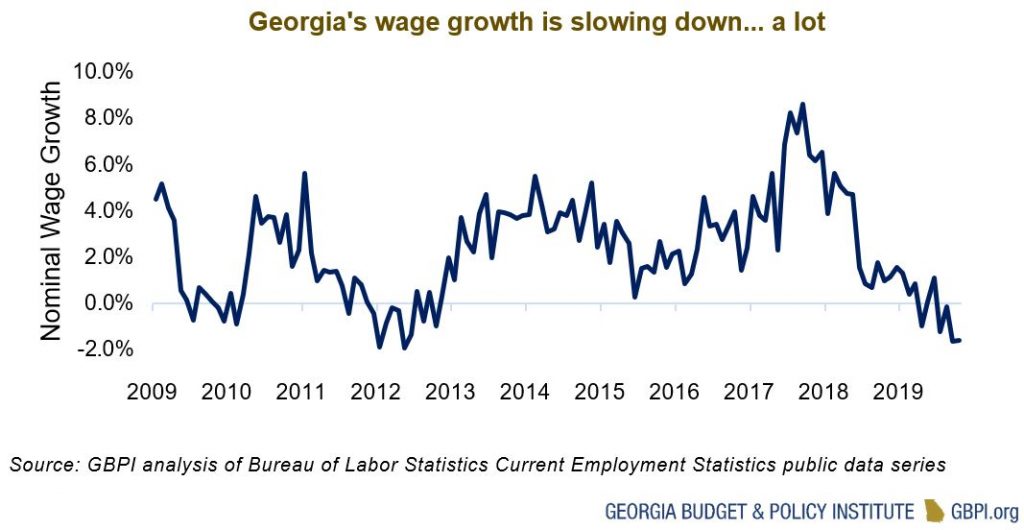Today is State Jobs Day, the time of the month when the Bureau of Labor Statistics releases new insights on the labor market. Many of us economic policy wonks obsess over the data, waiting to make meaning of it and write reports about how our states are trending when it comes to job creation. By very general measures of economic growth, Georgia seems to be doing well. Record unemployment and the addition of new jobs each month signals strength and resilience since one of the most disruptive economic recessions in the last century.
Another indicator of economic strength is wage growth, but this is often ignored in the conversation about economic expansion because the trends can be quite “puzzling,” as Federal Reserve Bank Chairman Jerome Powell stated in 2018. Yet, wage growth should be discussed, because wages are a crucial indicator of the quality of life of real people. Despite a record period of job growth and low unemployment, Georgia is not realizing the same gains in wage growth. Theoretically, low unemployment and job growth should put pressure on employers to increase wages, but that has not been the case in the last two years.
Following the recession, it took some time for wages to rebound in Georgia. When they did, growth remained tepid until 2017 when growth began to surge well above national growth rates. But shortly after, over 2018 and 2019, the growth rate has fallen at an alarming rate, one that is only comparable to what we saw during the recession. The chart below shows 12-month changes in nominal wages, or wages unadjusted for inflation.
While we cannot be certain which culprit is causing this trend, those of us who are paying close attention to the quality of jobs being created in Georgia are not surprised. Georgia’s largest and fastest–growing occupations include retail sales, food prep service and administrative support positions, and the median hourly wages for these jobs range from $9 per hour to $16 per hour, which is well-below what experts consider to be a livable wage in the state.
Twenty-nine states and D.C. realized that their economies are dependent on workers who are paid enough to take care of their families and invest in their communities, so they raised their state minimum wages above the federal minimum of $7.25. Leaders in those states are also investing in key supportive services that help people navigate from the bottom of the income ladder to the middle. Unfortunately, Georgia has fallen far behind other states by refusing to pass policies that encourage bold investments in workers who make too little.
In a world where the costs of basic needs like housing, food and transportation are on the rise daily, current wages in Georgia are headed nowhere unless we make some big policy changes. As we enter a new year and decade, GBPI will begin paying much closer attention to these Jobs Day trends.









